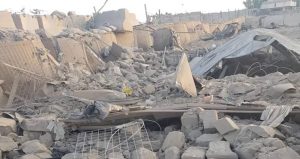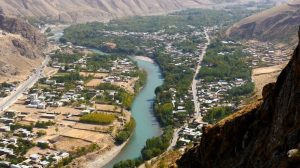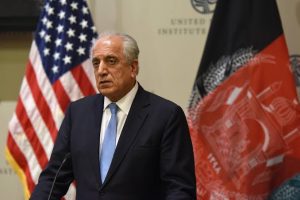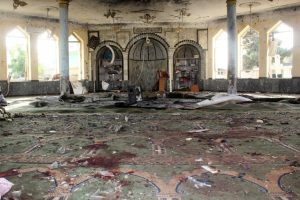What Goes on among Supporters and Opponents of Assad in Syria? (II)

 KABUL: (Middle East Press) Currently, various groups and countries which pursue their own goals and strategies are just deepening the crisis in Syria. In this article we are just trying to give you a better understanding of developments in Syria. In the first part of this article, we discussed the conditions of the supporters and opponents of Bashar al-Assad. In this second part of the article, we are going to discuss the role of the Kurds and the perspective of recent developments affecting the crisis in Syria.
KABUL: (Middle East Press) Currently, various groups and countries which pursue their own goals and strategies are just deepening the crisis in Syria. In this article we are just trying to give you a better understanding of developments in Syria. In the first part of this article, we discussed the conditions of the supporters and opponents of Bashar al-Assad. In this second part of the article, we are going to discuss the role of the Kurds and the perspective of recent developments affecting the crisis in Syria.
The Kurds
In Syria battleground, the Kurds played a positive role and acted in a quite rational manner. As in the initial days of the Syrian crisis, despite decades of the suppression of the Kurds in Syria, they decided to play a neutral role, and chose a different path. They declared an autonomous region in three Cantons of Afrin, Kobani and Jazira. They also announced that they were not at war with Bashar al-Assad or anti-Assad groups and are just trying to form an autonomous region of their own. Meanwhile, as the ISIS extremist forces entered the battlefield in Syria and made efforts to seize geo-strategic areas on the border with Turkey, the ISIS forces laid a siege to Kobani and conducted frequent attacks on the city. The four-month siege of Kobani encountered the heroic resistance of the People’s Protection Units (YPG) which inflicted a humiliating defeat on the ISIS terrorist group. At the time being, the Kurds have the upper hands among other actors in Syria. The Kurds have received support from the West and the US-led coalition in the framework of airstrikes against the positions of the ISIS and in this way the coalition forces have contributed to the strengthening of the positions of the Kurds. Currently they are devising a strategy to win back Tripoli from ISIS, a plan supported by the US-led coalition forces. On the other hand, among the friends of Assad, the current government and Russia have virtually supported the positive role of the Kurds in the fight against ISIS. The Russian government has recently announced that the Kurds should receive logistical support. The Kurds are trying to assume a positive role in the current state of the affair so that they can secure the support from the West and Russia to join together the three Cantons and take maximum benefit from the current situation in Syria. However, all positive conditions for the Kurds are defined for a short-term, and the Kurds cannot rely on the support of the West for a long-term period, as in current situation the Kurds have turned to the most important anti-ISIS army and the West tries to strengthen them in the short term so that it can inflict a humiliating defeat on ISIS and remove the threats of the ISIS terrorist group against the West.
The Future of the Events
With a look at the friends and enemies of Bashar al-Assad and the neutral rule of the Kurds against Assad, we can get a good grasp of the vague and complicated situation in Syria. It appears there is a strong cohesion and a clear goal among the friends of the Bashar al-Assad which helps them have a quick and clear performance. The friends of Assad aim to strengthen the positions of Assad and keep him in power. The friends of Bashar al-Assad including Iran, Russia, Iraq and Hezbollah are trying to strengthen his positions. The main complexity of the issue lies in the ranks of the enemies of Bashar al-Assad. On the one hand, the Western countries make an attempt to strengthen the positions of moderate parties; however, the US plan to train the moderate opponents of Assad has failed. Concerning the crisis in Syria, there is no clear objective among the Western countries. They neither take a serious stance to fight against the ISIS nor do they fully equip the anti-Assad groups as a basic strategy towards Assad. Turkey as a major player in the Syrian crisis has failed to persuade the West to overthrow Bashar al-Assad, and it has kept silent about the ISIS; however, sometimes it has made efforts to promote cooperation with the ISIS forces. Turkey has to deal with two main problems about Syria. On the one hand, Turkey sought to overthrow Bashar al-Assad, and has paid a high cost to achieve this goal; however, it has failed to do so. On the other hand, Turkey has to deal with the issue of the Kurds in Syria and the creation of an autonomous Kurdistan on its borders. To counter the Kurds, and considering the support of the West and the international community from the Syrian Kurds, Turkey has targeted the positions of the PKK, the mother of Syrian Kurds, as the military wing and political party of the Kurds in the Kurdish areas of Turkey and Iraq; Turkey has also resorted to political and judicial means to undermine the Kurdistan Democratic Party as a legitimate political party. The mobilization of the Turkish government and army against the Kurds have had unpleasant domestic and regional consequences and the ruling AK party has met with widespread criticism. On the other hand, Saudi Arabia known as the state sponsor of extremist movements in Syria, concurrent with the new king’s ascending the throne and subsequent developments, has adopted pragmatic policies, and makes attempts to be an active player in regional crises and counter Iran, Bashar al-Assad and the Shiite movements.
It is quite difficult to predict the future of Syria, but it should be noted that there are certain tactics among the friends of Bashar al-Assad to adopt a unified strategy for support from Bashar al-Assad and keep him in power. On the contrary, one can see the split and division among the enemies of Bashar al-Assad, their goals and strategies, and this make the upcoming trends more ambiguous for those countries and groups. The only clear point about the Syrian crisis is the fact that all active movements in Syria are the enemy of ISIS except for Turkey, which has not adopted any official policy against it. Meanwhile, some of these groups have made ISIS a pretext to strengthen their own positions. Bashar al-Assad holds out much hope that with the presence of the ISIS terrorist group, if the only way to put an end to the Syrian crisis is not to acknowledge that Assad should remain in power, certainly is one of the most important ways to resolve it. At this point, one can perceive the importance of presence of Iran and Russia for resolving the crisis in Syria.





